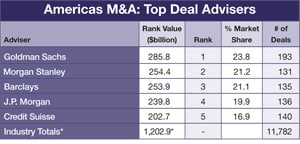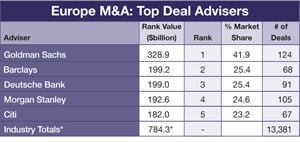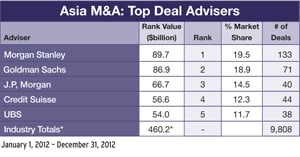CORPORATE FINANCING NEWS: MERGERS & ACQUISITIONS
By Gordon Platt
Thanks in large part to record levels of spin-offs and divestitures, global mergers and acquisitions achieved a 2% gain in 2012 to $2.6 trillion, according to Thomson Reuters.
Spin-offs and divestitures accounted for 47% of worldwide M&A activity last year, the largest percentage since records began in 1980.
The largest deal worldwide in 2012 was Abbott Laboratories’ spin-off in December of its research-based pharmaceuticals unit to its shareholders. Thomson Reuters gave the deal a rank value of $66.4 billion.
The pharmaceuticals spin-off, now known as AbbVie, owns Humira, an injectable rheumatoid arthritis drug that had sales of more than $7.9 billion in 2011. Abbott Laboratories will focus on medical devices, diagnostics and nutritionals.
DRIVING FORCE
Divestitures should remain a key driver for dealmaking in the year ahead, as companies seek to unlock value in assets, according to PwC US. Companies that are looking to divest assets have stepped up the sellside diligence process to showcase potential value, the firm says.
“Successful divestitures in today’s marketplace require a sharp focus on rationale around the opportunities that an asset has to grow,” says Ron Chopoorian, PwC’s US divestitures leader. “With preparedness and rigor around the sellside process serving as essential components for successful divestitures, we are seeing auctions becoming broader and participants staying in play for longer periods of time.”
The technology, media and telecommunications (TMT) sector is the most popular in terms of “companies for sale,” according to mergermarket’s global M&A heat chart. Consolidation in the advertising market is expected to continue, with bidders looking for sector expertise and geographical scale, mergermarket says.
Divestitures of risky assets have become commonplace, but another big deal in December involved companies getting back together again. Freeport-McMoRan Copper & Gold, an Arizona mining company, agreed to acquire two oil and gas companies: Houston-based Plains Exploration & Production, as well as McMoRan Exploration. Freeport had spun off the latter company in 1994.
Freeport paid a total of about $9 billion for the two companies, saying it wanted to diversify into a global natural resources company. Freeport also assumed a combined $11 billion in debt. It will gain energy assets in Texas, California and the Gulf of Mexico to balance its assets outside of the US, including mines in Indonesia and Africa.
Freeport’s stock price fell 16% on the day the deal was announced, as investors questioned its necessity and cost. Evy Hambro, a managing director at BlackRock, said during the conference call with Freeport executives: “I haven’t heard anything on this call that in any way justifies why these companies should be put together. I find it incredibly disappointing that as a management team, you’ve chosen to break the trust with investors from what the business was that we chose to invest in.”
NYSE TAKEOVER
Another transaction of note in December was the agreement by Atlanta’s IntercontinentalExchange to acquire NYSE Euronext for $8.2 billion in a cash-and-stock deal. ICE, one of the world’s largest derivatives markets, will keep the New York Stock Exchange building on Wall Street and will have a dual headquarters in Atlanta and New York.
Jeffrey Sprecher, ICE chair-man and CEO, will remain chief executive of the enlarged company. Duncan Niederauer, CEO of NYSE Euronext, will be chief executive of NYSE Group and president of the combined company.
ICE would like to divest Euronext’s cash equities business in Europe, including stock exchanges in Paris, Amsterdam, Brussels and Lisbon, market conditions permitting. ICE has long sought NYSE Liffe, the European derivatives exchange.



*Figuresmaynotaddup,asmorethanonebanktypicallyobtainscreditforanyonetransaction.Source: Thomson Reuters



